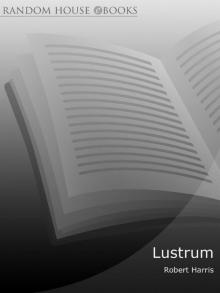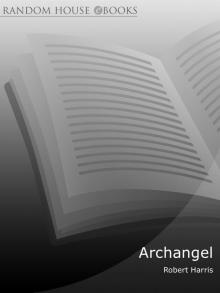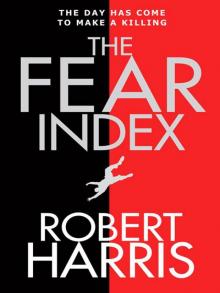- Home
- Robert Harris
Selling Hitler Page 14
Selling Hitler Read online
Page 14
15 March 1933: Visit of the specially chosen men, and the plans for the new Standarte [unit] of the SS in Lichterfelde. These SS Standarte must carry my name.
17 March 1933: The Christian Unions are training themselves to be apolitical. From today an SS Standarte is in place in Lichterfelde. As from now all the relevant security measures will be taken by these people. These people are particularly good National Socialists. The Standarte are now carrying my name and are sworn in to me.
18 March 1933: Visit to these Leibstandarte. They are very fine men. Stayed up talking to members of the Cabinet until very late at night.
Heidemann recited these banalities – typical of the diaries as a whole – and asked Mohnke for his opinion. Mohnke was not impressed.
I said to Herr Heidemann that several things in these diaries were simply not true. First, the SS Standarte never had their barracks in Lichterfelde. I belonged to that troop and in March and April 1933 we were in the Friesenstrasse, in the police barracks. Secondly, at that time this troop of men did not have the name Leibstandarte. Thirdly, the entry for 18 March 1933 was false: Adolf Hitler never visited this troop in the Friesenstrasse.
Heidemann listened to this apparently devastating judgement with equanimity. He had long ceased operating on a rational wavelength: doubts about the diaries’ authenticity were something he was not programmed to receive. ‘Perhaps,’ he suggested to Mohnke, ‘Adolf Hitler planned all that and was putting his thoughts down on paper.’
He was equally unperturbed when, in the spring of 1981, Eberhard Jaeckel published his apology in Germany’s leading historical journal, admitting that documents in his collected edition of Hitler’s early writings were forged. Jaeckel kept his word and did not name Stiefel personally – he described the documents as having ‘been in the hands of a private collector, totally unknown to the public’ – but he conceded that the doubts which had been expressed about their authenticity were ‘justified’. This was not only embarrassing to Jaeckel. It was also embarrassing to Stern. When Jaeckel’s book had first appeared, the magazine had paid him 3000 marks to reprint the Hitler poems under the title Rhymes from ‘H’: Kujau’s handiwork had thus been published in the magazine for the first time two and a half years before the launch of the diaries. Was it possible, wondered Walde, that the diaries came from the same source as the poems? Heidemann was dispatched to the Institute of Contemporary History in Munich to copy the forged documents and check if they too had originated from the Boernersdorf crash. Heidemann did not bother to contact Jaeckel. Instead he sent the documents directly to Kujau for him to inspect, then rang him a few weeks later to ask if he had ever seen them before. Kujau, not surprisingly, said he hadn’t and Heidemann reported back to Walde that there was no need for them to worry.
The publication of Jaeckel’s apology stirred Kujau to another act of forgery. All the doubts about the authenticity of the poems stemmed from the fact that ‘Der Kamerad’ was not the work of Hitler and could not have been copied by him because it was not written until 1936. Kujau attempted to calm the fears of Fritz Stiefel on this point by forging a letter, dated 18 May 1981, purportedly sent by a librarian at the East German ‘State Archive for Literature’ to his brother, ‘General Fischer’:
Comrade Fischer,
I inform you that the text of the document ‘Der Kamerad’ was originally written, in a slightly different form, by Xaver Kern in the year 1871. This verse was published repeatedly under different titles until 1942, always with slight textual variations. It was also published in 1956 in Volk und Wissen (East Germany, volume nine). I will send you a photocopy of the original in the next couple of days.
(Signed) Schenk.
If Heidemann had bothered to check with Jaeckel, or if Jaeckel had troubled himself to speak to Stern about the forged poems, Kujau’s activities would almost certainly have been exposed. As it was, his victims once again played into his hands and Kujau was allowed to carry on his lucrative business for another two years.
THIRTEEN
ON 13 MAY 1981, Pope John Paul II was shot and wounded in an assassination attempt in St Peter’s Square in Rome. When the news came through in the Stern building in Hamburg, there was an immediate editorial conference. This dramatic story had all the ingredients the magazine specialized in: violence, personal tragedy, conspiracy, espionage, international crisis, vivid pictures – Stern threw all its resources into reporting the evept. Someone with experience of foreign investigations should go to Turkey, home of the would-be assassin. The ideal choice was Heidemann. Had anyone seen him? Where was Heidemann these days?
Henri Nannen had stepped down from the day-to-day editing of Stern at the beginning of the year to become the magazine’s publisher. A triumvirate of editors-in-chief had replaced him: Peter Koch, responsible for politics, economics and foreign affairs; Felix Schmidt, in charge of the arts, entertainment and leisure sections; and a design expert, Rolf Gillhausen. Koch had already spent several fruitless sessions with Heidemann trying to force him to do some normal journalism for a change. Now, Schmidt undertook to track him down. He rang Thomas Walde, Heidemann’s departmental head. Walde said the reporter was not available. ‘I don’t care where he is,’ shouted Schmidt. ‘Get him into my office.’ In exasperation, he went to consult Nannen. ‘Who is Heidemann working for?’ he demanded. ‘The editors or the publishing company?’ Nannen said that obviously he worked for the editors and advised Schmidt and Koch to complain to the management.
Meanwhile, three floors above them, uncertain as to what he should do, Walde was speaking to Wilfried Sorge. Because Manfred Fischer was away the two men approached his deputy, Jan Hensmann, and explained the problem. Hensmann’s objective was a quiet life. His advice was that Heidemann should feign illness; Walde could then lie to the editors and tell them that Heidemann was on sick leave. Neither of the journalists was enthusiastic about this idea. With great reluctance, Hensmann finally accepted that the time had come to inform the lucky editors of the scoop the management was acquiring for them. The diaries were fetched from the safe and arranged in a pile on a small table in the corner of his office. Hensmann then rang Koch, the most senior of the editors, and asked him to come upstairs.
Koch’s first reaction on being shown the diaries was one of anger at having been deceived by the management. He rang down to Schmidt and Gillhausen in the Stern offices below and told them to come up and join him. Schmidt arrived a few minutes later to find his colleague ‘bent over a pile of A4-sized books. Koch said to me that they were the diaries of Adolf Hitler and that Heidemann had got them.’ Like almost everyone else in the company, they were unable to read the antiquated script. They could only concentrate on the diaries’ external features. Gillhausen noted that most of the books had a ‘black cover’, ‘a red cord and a red seal’, and a note pasted on the front ‘on which either Hess or Bormann had written that these books were the property of the Führer’. Hensmann said that Heidemann was not available for normal journalistic work because he was acquiring the books on the management’s behalf. Large sums of money had been paid. Absolute secrecy was necessary.
The editors retreated to Koch’s office to digest this information. Their reactions were mixed. There was unanimous resentment at the way they had been treated: five months into their new jobs it did not augur well for the future. On the other hand, the editors did not have the slightest doubt that the books were genuine. They had to be. Over half a million marks had already been spent. It was impossible to conceive of the shrewd, conservative, financially cautious managers of Gruner and Jahr investing in anything unless they were absolutely certain of its value. The three had to accept that if they rejected the diaries, they risked going down in history as the editors who threw away one of the biggest scoops since the war.
That point was made with brutal frankness a couple of days later, when Manfred Fischer returned and chaired a joint meeting of journalists and businessmen to review the whole project. Koch, Schmidt and Gillhausen faced Heidema
nn, Walde, Sorge and Hensmann. Fischer was not in the least apologetic for having circumvented the editors. As far as he was concerned their inept handling of Heidemann had almost lost the company this tremendous coup. He had no doubts about the authenticity of the diaries. ‘Do you think,’ he inquired, ‘that I would have committed so much money if I were not convinced?’ If Stern did not want the diaries, they could be marketed elsewhere: Bertelsmann could exploit the world rights; Bantam Books could handle the American publication. Heidemann scarcely opened his mouth. It was Fischer who explained the story of the East German general and his brother in the West whose identity could not be revealed. The three editors listened without enthusiasm. Humiliated and offended by the management’s behaviour, their attitude to Heidemann’s great scoop was, and would remain for many months, one of sullen acquiescence.
On 27 May, Heidemann crossed the border into East Germany and returned to Boernersdorf. This time he was on his own. He wanted to discover more about the crashed transport plane. He found some eyewitnesses to the disaster. Helda Fries, wife of a local hotel owner, described how the plane fell out of the sky, clipping the tops of the trees in the nearby Heidenholz forest. One of its three engines was wrenched off before it hit the ground. Richard Elbe, a local farmer who had been in the fields in charge of some Russian and French slave labourers, was the first to reach the burning wreck. Bullets were exploding, people trapped inside were screaming and hammering to get out. In front of them, one survivor, Franz Westermeier, crawled out of the chaos. ‘Come here you cowardly dogs,’ Elbe recalled him shouting. ‘Come here. You are just too scared.’ But the heat was too intense for the rescuers to get close. A farmworker, said Elbe, called Eduard Grimme later pulled the corpses from the wreckage. ‘They didn’t look like people any more. The arms were gone and the legs and everything else was charred.’ The remains were examined in the local morgue by a German medical officer. On one body was a cigarette case embossed with the symbol of Lufthansa and the words: ‘In memory of 500,000 kilometres flying.’ It had belonged to Gundlfinger. The remains of the plane were cordoned off by German police and SS men. But according to Erwin Goebel, son of the mayor at that time, ‘many people managed to salvage parts from the aircraft and got richer for it, soldiers included.’ Debris and pieces of luggage were scattered all over the forest. Richard Elbe had carried off two cockpit windows and used them to build part of a shed.
It was all very insubstantial – fragments of gossip, hazily recalled thirty-six years after the event. Nevertheless, it was something for Heidemann to grasp at. He bought the two old windows off Elbe and carted them back with him to Hamburg where he showed them off as further proof of the story.
On 1 June he received a further 225,000 marks. Shortly afterwards he returned from Stuttgart with more books. There were now twelve Hitler diaries in the management safe.
In May, Manfred Fischer had let another member of the publishing company’s management into the secret of the diaries’ existence. He was Dr Andreas Ruppert, Gruner and Jahr’s legal adviser. Fischer wanted his opinion of the legality of the whole project. Would Stern be able to publish the diaries? Who owned the copyright?
Ruppert reported back that determining ownership of Hitler’s estate was complex, indeed almost impossible. Hitler’s property, together with 5 million marks owed to him by the publishers of Mein Kampf, was confiscated, after a court case, by the State of Bavaria in 1948. Hitler’s will was declared invalid and in 1951, the Bavarian authorities seized personal objects bequeathed by Hitler to his housekeeper to prevent her selling them. But the following year they had been unable to prevent the appearance of Hitler’s Table Talk: the state apparently owned rights in Hitler’s literary estate only as far as published material was concerned; previously unpublished material fell outside their control. It was impossible to predict how the Bavarians or the Federal Government would react to news of the diaries’ existence. The situation was further complicated by the fact that various private deals had been arranged with Hitler’s descendants. François Genoud, the Swiss lawyer and ex-Nazi, had signed an agreement with Paula, Hitler’s sister, shortly after the war. But Paula was long since dead. Meanwhile, the West German historian, Werner Maser, had a separate contract to act as a trustee for the Hitler family. It was decided, as a first step towards securing ownership of the diaries, to make a deal with Maser.
Maser was a controversial figure. Ten years previously he had written a bestselling biography of Hitler, translated into twenty languages, which was regarded as having dwelt, at suspicious length, on the positive aspects of Hitler’s character and achievements. In 1977 he had written a book attacking the Allied handling of the Nuremberg Trials, stating that, in many instances, the hanged war criminals were victims of a miscarriage of justice. His relations with the left-wing Stern were strained. The magazine therefore approached him through his former assistant, Michael Hepp. According to Maser:
[Hepp] rang me in the summer of 1981 and asked me if I was interested in talking to a journalist from Stern. I told him of my basic objection to newspapers like Stern…. Herr Hepp said that this journalist was a very sensible man who also had a large collection of Hitler memorabilia. We agreed a date and shortly afterwards Hepp and Heidemann came to see me.
Heidemann arrived at Maser’s home in Speyer, near Heidelberg, on 11 June. Without mentioning the diaries, he asked the historian to sell him the rights to any original Hitler material which he had already discovered or might discover in the future. After a week’s haggling over terms, a handwritten contract was drawn up and signed on 18 June:
Professor Dr Werner Maser receives, as the administrator of Hitler’s will on behalf of Hitler’s descendants, a fee of 20,000 marks, paid in cash. For this sum he allows Gerd Heidemann the rights to all the discovered or purchased documents or notes in the hand of Adolf Hitler, including transcribed telephone conversations and other conversations which have so far not been published and which could be used for publication. Professor Dr Werner Maser gives to Gerd Heidemann all the rights necessary for this, including personal rights and copyrights. Dr Maser affirms that he is empowered to do this on behalf of the family. This document is completed in the legal department in Hamburg and is valid in German law.
Heidemann then opened a suitcase and pulled out a bundle of money. He counted out twenty-two 1000-mark notes and handed them to Maser.
After delivering the twelfth diary, Heidemann suddenly announced a price increase. Instead of costing 85,000 marks each, the books would now cost 100,000 marks. The East German general, he told the Stern management, was insisting on more money: to continue supplying the books, he was having to bribe an increasing number of corrupt communist officials. This news was a disappointment to the company. They had originally expected to have all the books in Hamburg by mid-May; instead, by mid-June, they had less than half. But they certainly did not want to jeopardize the project at such a late stage. They had no alternative but to agree to pay. Not once did they suspect where the additional cash was really going.
After years of living in debt, Heidemann was now awash with money. Over the following months he and Gina went on a spending spree impressive even by Hamburg’s wealthy standards. In one of the city’s department stores he bought 37,000 marks’ worth of furnishings to renovate their flat; he produced the money from his jacket pocket with the bank’s seal still on the bundles. At the Luehrs travel agency he put down 27,000 marks in cash on the counter and booked firstclass cabins for himself and his family on the maiden voyage of the luxury liner Astor. The staff had no difficulty in describing the event to the police in 1983 – years later they could still remember the difficulty they had trying to stuff all Heidemann’s money into the till. Gina got two cars – a convertible BMW 318 for 32,000 marks and a Porsche 911 for 26,000. The Heidemanns eventually moved into larger accommodation on the Elbchaussee, Hamburg’s most exclusive street: not content with one, they rented two apartments. A fortune went on jewellery and carpets.
&nb
sp; Inflated by Stern’s money, Heidemann’s compulsion to collect Nazi memorabilia ballooned out of control. Some of it was presumably genuine, like Karl Wolff’s SS honour dagger, for which Heidemann paid the old general 30,000 marks. Most of it, however, came from Konrad Kujau. It included a swastika banner which Kujau passed off as the ‘Blood Flag’, the famous symbol of Hitler’s abortive beer hall putsch of 1923, preserved on Hitler’s orders like a holy relic in honour of the sixteen Nazi ‘martyrs’ killed that day. In reality, Heidemann’s ‘Blood Flag’ was simply an ordinary swastika banner – of which there are thousands in existence – to which Kujau had added his usual forged authentication. The swastika was in an old glass case upon which was glued a note: ‘As the condition of the flag has suffered greatly in the years of confiscation it is shown in the flag hall of the Brownhouse behind glass. According to the wishes of the Führer.’

 An Officer and a Spy
An Officer and a Spy Dictator
Dictator Imperium:
Imperium: Enigma
Enigma Fatherland
Fatherland Dictator:
Dictator: Lustrum
Lustrum Archangel
Archangel Conclave
Conclave The Fear Index
The Fear Index The Second Sleep
The Second Sleep V2
V2 Lustrum c-2
Lustrum c-2 Imperium
Imperium The Dictator
The Dictator Selling Hitler
Selling Hitler Archangel (Mass Market Paperback)
Archangel (Mass Market Paperback)